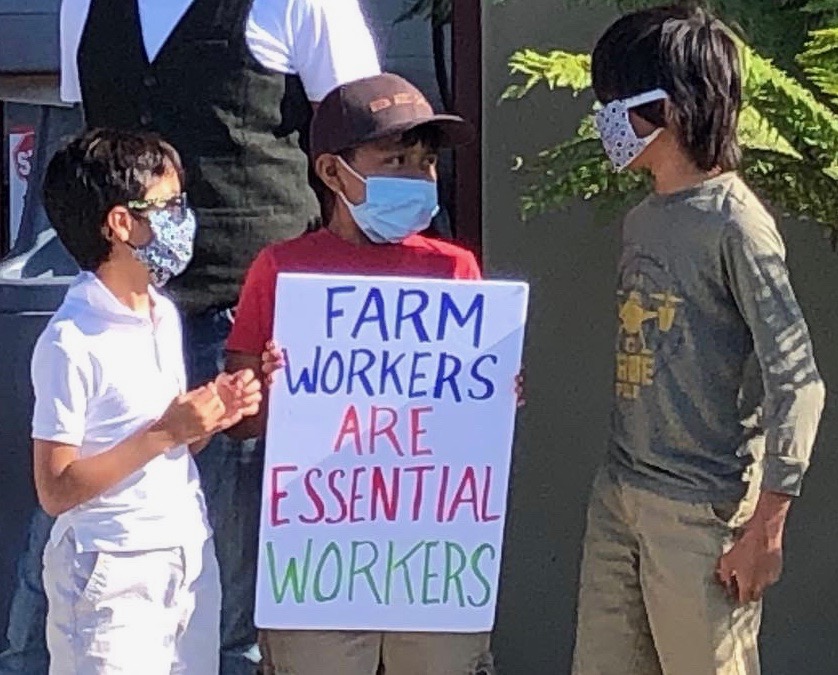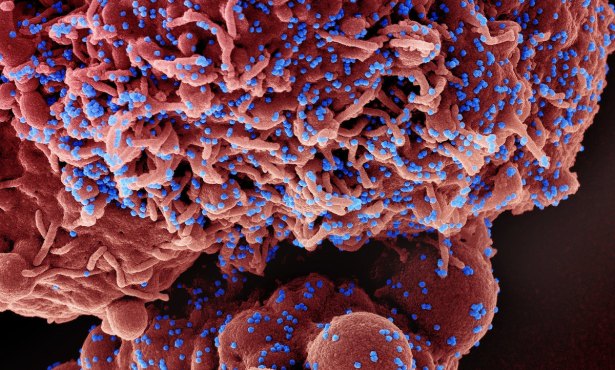Santa Barbara County Strengthens COVID Protocols at Farmworker Housing After Outbreaks
CAUSE Continues Its Farmworker Advocacy Work

A major victory for farmworkers came on September 11, when Santa Barbara County Public Health issued an order requiring daily COVID screening of all residents at H-2A housing, self-isolation of those with symptoms, notification by the housing operator of any confirmed cases, and a $1,000 penalty for failure to comply. H-2A refers to the federal guest worker program under which many farmworkers in Santa Barbara and Ventura counties are brought to this country. On September 17, Ventura County passed an order with the same requirements.
As with other issues affecting farmworkers, CAUSE (Central Coast Alliance United for a Sustainable Economy) was actively engaged in getting these orders passed. Regular screening, according to Community Organizing Director Hazel Davalos, is critical to keep a positive case of one worker from developing into a full-blown outbreak.
The orders follow large COVID outbreaks in H-2A housing in each county. The first major one, in Ventura, was at Reiter Affiliated Cos.’s Villa Las Brisas in Oxnard, which led to the testing of all 200-plus residents, with 198 testing positive. According to Ventura County Public Health, there have also been outbreaks at Calavo Growers, Magana Labor Service, Fillmore Piru Citrus, and Prime Time International. A total of 468 farmworkers have tested positive in Ventura County.
According to Santa Barbara County Public Health, 104 employees of Alco Harvesting, a Santa Maria harvest management company, contracted the virus, including one who died. Alco did not report the outbreak to Public Health. At Rancho Nuevo Harvesting, 33 workers tested positive.
After the Villa Las Brisas outbreak, CAUSE and MICOP (Mixteco Indigena Community Organizing Project) sounded the alarm with authorities in both counties. As the Alco outbreak unfolded, CAUSE alerted Public Health that these employees were all residing in congregate living and that action was quickly needed to stave off further transmission.
The outbreaks were not surprising to CAUSE Policy and Communications Director Lucas Zucker, given the close proximity farmworkers are to one another in housing, transportation, and the fields. Multiple farmworkers can be housed in single hotel rooms or in overcrowded single-family houses. Workers are transported to the fields in vans. In some fields, when workers are on breaks, they must choose between social distancing in the hot sun or availing themselves of limited shade close to coworkers.
Get the top stories in your inbox by signing up for our daily newsletter, Indy Today.
Under the H-2A Program, the farmworker’s visa, employment, housing, and transportation are all arranged by his or her employer. As a result, according to Zucker, farmworkers are fearful to report any illness or any workplace health or safety violation. Apart from the fear, Zucker added, there’s also a lack of knowledge of available assistance because of both language barriers and being newly arrived in the country. Further complicating matters is that farmworkers are often employed by labor contractors, who then contract with agricultural employers, so workers are reporting to a company that is not directly employing them.
Compounding the severity of the situation is that farmworkers have high comorbidity rates for COVID-19 such as asthma and diabetes, making them especially susceptible to COVID complications.
While CAUSE is pleased with the new health orders, Zucker wishes the orders went further. The orders strongly recommend that H-2A housing operators utilize stable groups of 14 or fewer in work, transportation, and meals to reduce potential COVID transmission. These should be requirements, not recommendations, according to Zucker, to diminish transmission rates for this vulnerable population.
Another significant development for farmworkers was the CA Housing for the Harvest Program, which Santa Barbara joined in early September. The state provides 14-day hotel stays for farmworkers unable to quarantine at home after testing positive for or being exposed to COVID-19. The county provides transportation, meals, and wellness checks. While Santa Barbara County already was providing hotels for farmworkers in this situation, the wellness component of the state program is, according to Zucker, especially important for this demographic. The nonprofit Family Services Agency, a culturally and linguistically competent nonprofit, checks in on farmworkers, who are often newly arrived and non-English speaking, and assists with medical care and supplies.

State law offers considerable workplace protections for farmworkers, and Cal/OSHA issued specific guidance for COVID, but according to Zucker, the rules on the books are not the rules in the fields. Cal/OSHA operates largely on a complaint-driven basis and given the dependency of the farmworker on the employer, abuses go unreported. When a complaint-driven inspection does occur, Cal/OSHA provides notice, allowing the employer to temporarily rectify the problem. Outside of these occasional announced inspections, farmworker advocates report no visible enforcement efforts.
One of CAUSE’s priorities now is getting a dedicated hotline for farmworkers. Many factors, according to Zucker, support the creation of such a dedicated line, including the complexity of agricultural issues, language barriers, and the vulnerability of the farmworker population.
The provision of adequate shade for breaks has always been an area of concern, and with COVID, the issue has become more critical. A worker-led action at Rancho Laguna Farms last spring, for which CAUSE provided legal and negotiating support, led to increased pay, a tripling of the amount of shade, and other benefits.
For years, CAUSE has been working to address toilet and water issues in the fields, which, like shade, have become even more important issues with COVID. CAUSE receives many complaints from workers that porta potties aren’t cleaned and that drinking water is not clean, cold, or readily accessible, and CAUSE will continue to advocate that S.B. County Public Health and Ventura County Public Health take action.
More broadly, CAUSE continues its Safety Net for All campaign, which seeks systemic change — access to unemployment insurance and safety-net programs for undocumented immigrants. Farmworkers are working through the pandemic, just like they worked through the fires, according to Zucker, out of necessity. It is time that they be valued by society, Zucker emphasizes, and be made eligible for government assistance.
While the pandemic continues, wildfires pose another danger for farmworkers. Instead of halting work when fires rage, growers sometimes want work intensified to get the crops harvested before the smoke ruins them. A new state mandate requires employers to supply proper masks when the air reaches the unhealthy zone (AQI 150+), and the state did ship about 1.4 million N-95 masks to agricultural commissioners, including 260,000 to Santa Barbara and 151,000 to Ventura counties.
Davalos points to the silver lining in the first month of the pandemic, when there was wide public support for essential workers, including farmworkers, which enabled workers at Rancho Laguna Farms to amass 61,000 petition signatures in support of their demands, helping to pressure the employer into making concessions. Davalos laments that public support has waned as the pandemic slogs on, but CAUSE continues its critical advocacy for this vulnerable population providing essential services for the entire community.
For more info about CAUSE or to make a donation, go to causenow.org.
Every day, the staff of the Santa Barbara Independent works hard to sort out truth from rumor and keep you informed of what’s happening across the entire Santa Barbara community. Now there’s a way to directly enable these efforts. Support the Independent by making a direct contribution or with a subscription to Indy+.



You must be logged in to post a comment.